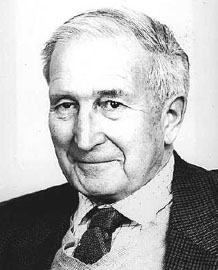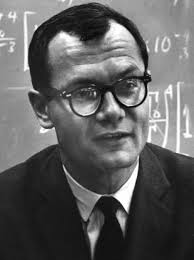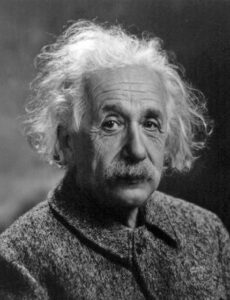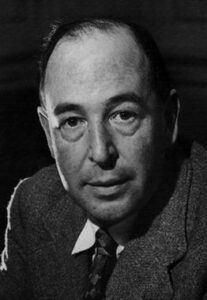Willful Blindness
Willful Blindness
Preconceived notions can prevent otherwise intelligent and discerning people from recognizing the obvious.

By عبد الله الصيدلي at Arabic Wikipedia – Transferred from ar.wikipedia to Commons., Public Domain, Link
The editor of an obscure journal Proceedings of the Biological Society of Washington decided to publish a paper making the case for intelligent design. Intelligent design is a controversial theory that suggests that life is too complex to have been self-assembled by accident. Instead – as with all extremely complex machines that perform a function – it was put together by an intelligent designer.
The Smithsonian Institute helps to fund and run this journal and, within hours voiced its intense displeasure that any favor would be granted the heretical notion of intelligent design. They lashed out at the editor and claimed he was an incompetent scientist and a closet evangelist. No matter that Richard Sternberg was a published, respected evolutionary biologist, the heresy must be stomped out quickly and without mercy.
They were saying I accepted money under the table, that I was a crypto-priest, that I was a sleeper cell operative for the creationists. I was basically run out of there.
The intensity of this retaliation against Steinberg caught the attention of the U.S. Office of Special Counsel which protects federal employees from reprisals. They examined e-mail traffic from the opposing scientists and noted that
retaliation came in many forms … misinformation was disseminated through the Smithsonian Institution and to outside sources. The allegations against you were later determined to be false.
Sternberg is hardly an uneducated charlatan. He holds two PhDs in evolutionary biology, and his graduate work produced praise from his advisors. He felt that science should examine all views and come to a conclusion after careful study and with the scientific method as to the one view that seemed most likely to be true. Sternberg noted,
I am not convinced by Intelligent Design, but they have brought a lot of difficult questions to the fore. Science only moves forward on controversy.
Multiple scientists had been mailed the “offensive” article for peer review. Sternberg noted,
They were critical of the paper and gave 50 things to consider. But they said that people are talking about this and we should air the views.
Within days, scientific critiques of the article appeared on websites. For example, Nick Matzke of the National Center for Science Education noted,
The origin of genetic information is thoroughly understood. If the arguments were coherent this paper would have been revolutionary – but they were bogus.
Of course, the “origin of genetic information” is anything but “understood” and remains a complete mystery. Sternberg has written about his experiences, his firing, his marriage dissolution, and the intense vitriol leveled against him for daring to suggest the possibility of an alternative explanation for the origin of life.
Some branches of science have developed a de facto Office of Orthodoxy, a Soviet-style magisterium that evaluates all scientific literature to ensure it reaches the proper conclusions. Any deviation from the Orthodoxy invites scrutiny by the magisterium and likely expulsion from popular society. Your career is lost, all funding is withdrawn, baseless accusations are hurled against you in such volume that is totally impossible to defend against.
This is the current state of “science” in the new Orthodoxy. No longer are new ideas evaluated or new hypotheses tested. In an ironic twist of history, modern evolutionary science has assumed the rule of the inflexible Church Inquisition against modern-day Galileos.
History of Willful Blindness
Willful blindness is common among atheists – especially among scientists. Not only is the blindness willful, but the censorship of any other opinion is also the norm. Research that might support intelligent design is blocked and when it does get through the process of peer review and get published, the editors are pilloried, and often their careers are ruined.

Robert Jastrow
Dr. Robert Jastrow was one of the most famous astronomers of the last century. He received his Ph.D. from Columbia University and worked for many years at NASA.
Jastrow was agnostic, but he spoke about the concept of willful blindness in his book, God and the Astronomers. He described how scientists react when encountering information that might support intelligent design,
Their reactions provide an interesting demonstration of the response of the scientific mind – supposedly a very objective mind – when evidence uncovered by science itself leads to a conflict with the articles of faith in our professions. It turns out that the scientist behaves the way the rest of us do when our beliefs are in conflict with the evidence. We become irritated, we pretend the conflict does not exist, or we paper it over with meaningless phrases.
Astrophysicist Hugh Ross in his book The Creator and the Cosmos, noted concerning the life of Albert Einstein,
It was 1916 and Albert Einstein didn’t like where his calculations were leading him. If his theory of General Relativity was true, it meant that the universe was not eternal but had a beginning. Einstein’s calculations indeed were revealing a definite beginning to all time, all matter, and all space. This flew in the face of his belief that the universe was static and eternal.
Einstein later called his discovery “irritating.” He wanted the universe to be self-existent—not reliant on any outside cause—but the universe appeared to be one giant effect. In fact, Einstein so disliked the implications of General Relativity—a theory that is now proven accurate to five decimal places—that he introduced a cosmological constant (which some have called a “fudge factor”) into his equations in order to show that the universe is static and to avoid an absolute beginning.
Einstein did not like the results of his research and so he invented a “fudge factor” which would cancel out the offending parts. There was no objective reason for this fudge factor other than it would make the calculations come out the way he wanted.
Einstein Realized his Willful Ignorance
Unfortunately for Einstein, observational objective evidence would pile up ruining his preconceived notions. Specifically, he would have to abandon his notion that the universe was infinite in time and size and came to realize this simply was not true.
In 1919, British cosmologist Arthur Eddington conducted an experiment during a solar eclipse which confirmed that General Relativity was indeed true—the universe wasn’t static but had a beginning. Like Einstein, Eddington wasn’t happy with the implications. He later wrote, ‘Philosophically, the notion of a beginning of the present order of nature is repugnant to me… I should like to find a genuine loophole.’
By 1922, Russian mathematician Alexander Friedmann had officially exposed Einstein’s fudge factor as an algebraic error. (Incredibly, in his quest to avoid a beginning, the great Einstein had divided by zero—something even schoolchildren know is a no-no!) Meanwhile, Dutch astronomer Willem de Sitter had found that General Relativity required the universe to be expanding. And in 1927, the expanding of the universe was actually observed by astronomer Edwin Hubble (namesake of the space telescope).
Looking through the 100-inch Hooker telescope at California’s Mount Wilson Observatory, Hubble discovered a “red shift” in the light from every observable galaxy, which meant that those galaxies were moving away from us. In other words, General Relativity was again confirmed—the universe appears to be expanding from a single point in the distant past.
In 1929, Einstein made a pilgrimage to Mount Wilson to look through Hubble’s telescope for himself. What he saw was irrefutable. The observational evidence showed that the universe was indeed expanding as General Relativity had predicted. With his cosmological constant now completely crushed by the weight of the evidence against it, Einstein could no longer support his wish for an eternal universe. He subsequently described the cosmological constant as ‘the greatest blunder of my life,’ and he redirected his efforts to find the box top to the puzzle of life. Einstein said that he wanted to know how God created the world. ‘I am not interested in this or that phenomenon, in the spectrum of this or that element. I want to know His thoughts; the rest are details.
Einstein noted,
Most people think it is the intellect that makes a great scientist. They are wrong. It is their character.
It is important to follow the evidence wherever it might lead, even if it leads in an uncomfortable direction. The marketplace of ideas needs to be fed with all viewpoints, with information to support or oppose those ideas. Otherwise, the marketplace becomes nothing more than an echo chamber for those in power or those who control the narrative. History has shown that never turns out well.
Kuhn’s book points out dozens of historical cases where scientists were far from being unbiased or neutral and even altered their results to fit their preconceived narrative.
C.S. Lewis and Willful Ignorance
Lewis was a skeptic early in life as was the norm of most professors in early twentieth-century England. He was surprised to find that his friend, J.R.R. Tolkien, believed in God and Christ as the Son of God. Most academics believed Biblical Christianity was a throwback to the Middle Ages and could not be a belief system held by any modern educated person.
Lewis was unusual in that he carefully evaluated the objective evidence concerning Christianity as well as its philosophical underpinnings. Gradually over years, his mind was drawn to believe Christianity was actually true.
He resisted this conclusion because his attraction to atheism was largely based on the moral freedom it provided. Atheism contends that you are free to follow your desires as long as you do not hurt others. Furthermore, Lewis concluded most people do not believe in Christianity because it might restrict their current libertarian lifestyle.
Summary
America and most of the civilized world has entered into what is called post-modern society. The Enlightenment helped to define truth and developed the scientific method to help scientists determine whether a hypothesis was valid or not.
This relentless search for an objective reality helped science produce the world we have today. It also helped to produce our legal system where certain acts are considered intrinsically immoral because of their adverse consequences for society at large.
This has all changed.
Truth is now defined by each individual. What is “truth” for one person is not “truth” for another. This means there is no “objective morality” that can be defined as a bedrock principle.

Life Molecules
The emergence of the COVID virus pandemic has illustrated this epistemology’s difficulty. Governors have based their rulings regarding lockdowns more on what they think should be true rather than science.
For example, even though we know that the spread of COVID is vanishingly small in public schools when simple precautions are taken, governors continue lockdowns of schools for months on end. The unintended consequences of these rulings have been catastrophic with childhood depression and suicide reaching their own epidemic proportions. Businesses are ruined, the financial stability of families has been wrecked, domestic violence is out of control, and yet the lockdowns continue.
Similarly, even though each passing year shows life to be exponentially more complex than our wildest imagination. We now know that “junk DNA” is not junk but involves regulating protein synthesis and other functions. Small factories and machines have been identified that interact with each other in complex ways. Vast quantities of information are transmitted from one generation to another; science has no explanation for the natural source of this information.
Anywhere – except in biology – the existence of advanced interacting machines and coded information systems would be explained by intelligence. A computer language can not be generated by chance just as DNA can not be produced by chance.
The logical construct identified as inductive reasoning or conclusions based on the best, simplest explanation determines what is the most likely answer to a problem. In origin-of-life science, the best explanation – that life arose from intelligence – is ignored as it begs to question the identity of that intelligence.
Future years will continue to provide increasing evidence of an intelligent designer and further roadblocks for the neo-Darwinian evolutionist. Intellectual freedom will be denied those who do not promote the proper narrative and iron-clad control over scientific journals will be strictly enforced.
But the tide is turning; the Truth will be out. The eyes of those with willful blindness will be opened.






